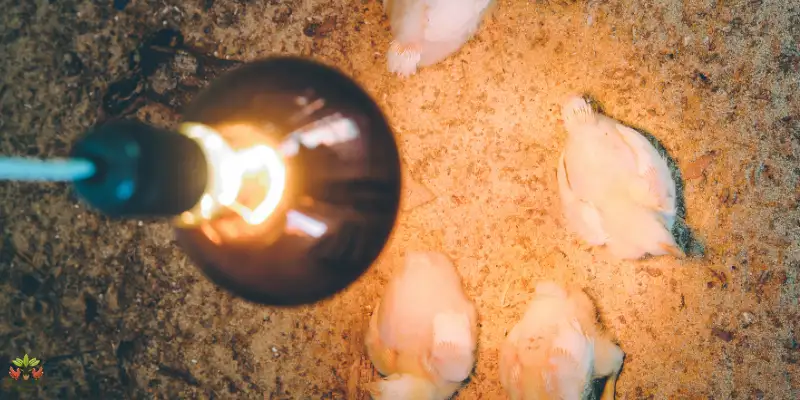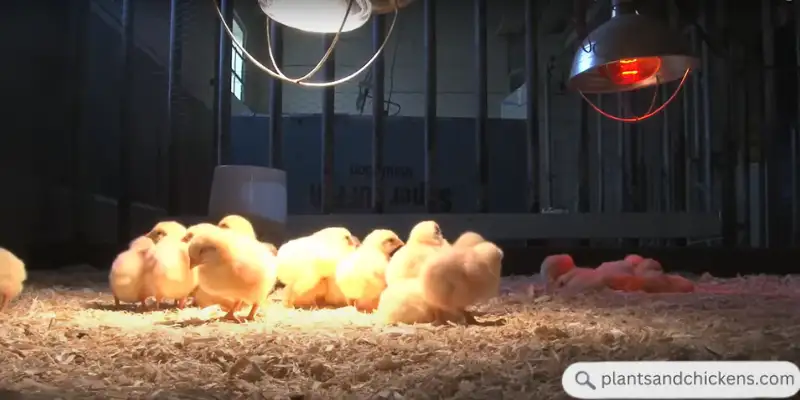Broiler chicks do not need light at night. The amount of light needed for growing meat birds is a topic of debate among producers.
Low light levels can reduce fighting and feather picking but may result in leg problems since the birds spend more time resting.
Table of Contents
The Importance Of Light For Broiler Chicks
Broiler chicks require light at night for their development and well-being. Adequate lighting conditions not only help reduce fighting and feather picking but also promote better weight gains. However, low light levels can result in increased leg problems, as chicks spend more time resting.
The Role Of Light In Broiler Chicks’ Growth
Light plays a crucial role in the growth and development of broiler chicks. Broiler chicks require the right amount of light to ensure optimal health and growth. The availability of light affects various aspects of their well-being, including their behavior, health, and overall development.
Effects Of Light On Behavior And Health
Light has a significant impact on the behavior and health of broiler chicks. Adequate light exposure helps regulate their circadian rhythms, which are essential for proper feeding, resting, and activity patterns. It also promotes healthier bone development and reduces the risk of leg problems. Moreover, sufficient light exposure can minimize fighting and feather picking among broiler chicks, resulting in improved weight gains.
Common Practices For Providing Light To Broiler Chicks
Producers follow specific practices to ensure broiler chicks receive adequate light. It is common to provide a consistent light-dark cycle to mimic natural lighting conditions. Typically, broiler chicks are exposed to 24 hours of light for the first few days after hatching. Then, the light duration is gradually reduced to 20 hours a day. This gradual decrease helps them adjust to a regular light-dark cycle.
Producers often use artificial lighting, such as LED or fluorescent lights, to provide consistent illumination. The light intensity should be sufficient but not too bright to prevent any negative effects on the chicks’ behavior. Additionally, it is crucial to monitor the lighting system regularly and ensure it is functioning correctly to avoid any disruptions in their growth and development.

Do Broiler Chicks Need Light At Night?
Broiler chicks require light at night to prevent fighting and feather picking, leading to better weight gains. However, too little light can cause leg problems as the birds spend more time resting. Finding the right balance is essential for their growth and well-being.
Different Perspectives On Providing Light At Night
Producers often have different opinions on the amount of light needed for broiler chicks during nighttime. While some believe that keeping broilers at low light levels reduces fighting and feather picking, resulting in better weight gains, others argue that low light levels can lead to an increase in leg problems as the birds spend more time resting.
Benefits And Drawbacks Of Providing Light At Night
Providing light at night can have both advantages and disadvantages when raising broiler chicks. Some potential benefits include:
- Improved visibility, allowing chicks to find food and water easily
- Reduced stress and anxiety, promoting better overall health
- Enhanced activity levels, contributing to muscle development
However, there are also drawbacks to consider:
- Potential sleep disruption, leading to decreased rest and growth
- Increased energy consumption, potentially affecting feed conversion efficiency
- Possible leg problems due to extended periods of movement
Optimal Light Intensity And Duration For Broiler Chicks
When providing light at night to broiler chicks, it is important to consider the optimal light intensity and duration. Light intensity should be sufficient for chicks to see clearly without causing discomfort. A recommended light intensity is around 20-30 lux, which can be achieved using low-wattage bulbs or LED lights.
In terms of duration, broiler chicks benefit from a consistent light-dark cycle that mimics natural daylight. A common practice is to provide 23 hours of light and 1 hour of darkness during the initial weeks, gradually decreasing the light duration until reaching 18-20 hours of light per day.
Potential Issues With Providing Light At Night
Producers may have differing opinions on the amount of light needed for broiler chicks. Low light levels can reduce fighting and feather picking, but may lead to increased leg problems. It is important to find a balance for optimal growth.
Leg Problems And Resting Patterns
Providing light at night for broiler chicks can have potential issues that need to be considered. One concern is the impact on the chicks’ leg health and resting patterns. When broiler chicks are exposed to continuous light, they tend to spend more time resting, which can lead to an increase in leg problems. Chicks that are constantly sitting or lying down may develop leg deformities and impaired movement.
This is why it is important to establish a balance between light and darkness for broiler chicks. While sufficient light is necessary for their growth and development, providing some dark periods during the night allows the chicks to rest and move around freely, reducing the risk of leg problems.
Impact On Sleep And Natural Rhythms
In addition to leg problems, providing light at night can also disrupt the natural sleep-wake cycle and natural rhythms of broiler chicks. Similar to humans, chicks have internal biological clocks that regulate their sleep patterns and other physiological processes. Continuous exposure to light during the night can interfere with their ability to get adequate rest and disrupt their natural rhythms.
Without proper periods of darkness, broiler chicks may become restless, agitated, and exhibit abnormal behaviors. Their sleep quality can be compromised, leading to reduced growth rates and overall health. As chicks require sufficient rest for optimal development, it is important to consider the impact of nighttime lighting on their sleep patterns and natural rhythms.
Considerations For Nighttime Lighting Systems
When providing light at night for broiler chicks, it is essential to implement a suitable nighttime lighting system that takes into account their needs and potential issues. Here are some considerations to keep in mind:
By implementing a well-thought-out nighttime lighting system, broiler chicks can have the optimal balance of light and darkness, promoting their leg health, sleep quality, and overall well-being. Remember, it’s important to prioritize their natural needs and rhythms when considering lighting at night.

Proper Lighting For Optimal Broiler Growth
Proper lighting is crucial for optimal broiler growth, but when it comes to broiler chicks, do they need light at night? While producers may not agree on the amount of light needed, keeping broilers at low light levels can reduce fighting and feather picking, resulting in better weight gains.
However, it’s important to note that low light levels may increase the risk of leg problems as the birds spend more time resting.
Guidelines For Light Intensity And Duration
When it comes to raising broiler chicks, providing proper lighting is essential for their optimal growth. The right light intensity and duration help regulate their behavior, promote feeding and drinking habits, and influence their overall well-being.
Here are some guidelines to ensure your broiler chicks receive the appropriate light:
- Light intensity: Broiler chicks require a minimum light intensity of 20 lux throughout the entire house. This level of brightness ensures that they can see and move around comfortably, encouraging active engagement in feeding and drinking.
- Light duration: During the first week, it is recommended to provide continuous light for 24 hours. This constant illumination promotes early eating and drinking, which is vital for their growth and development. After the first week, gradually decrease the light duration by 30 minutes per week until reaching a maximum of 18 hours of light per day.
Strategies For Managing Light To Promote Growth
Proper management of lighting in broiler houses is crucial to ensure optimal growth and well-being. Here are some strategies you can implement:
- Uniform lighting distribution: Ensure a consistent light distribution throughout the house by strategically positioning light fixtures. This helps prevent dark areas and encourages equal activity levels among the chicks.
- Dimming options: Implement a dimming system to gradually adjust the light intensity. This can simulate natural daylight patterns and create a more comfortable environment for the broiler chicks.
- Lighting control: Automate lighting control to maintain a consistent schedule. Use timer switches or light control systems to ensure the right light duration and intensity are provided at the appropriate times.
Monitoring And Adjusting Lighting Practices
To ensure your broiler chicks’ lighting needs are met, it is important to monitor and make necessary adjustments as required. Consider the following:
By following these guidelines and implementing effective strategies for managing lighting, you can provide broiler chicks with an environment that promotes optimal growth and overall well-being.
The Role Of Darkness For Broiler Chicks
Broiler chicks require darkness at night to promote rest and reduce fighting and feather picking. However, too little light can lead to increased leg problems. Finding the right balance is crucial for optimal growth and development.
Why Darkness Is Essential For Broiler Chicks
Darkness plays a crucial role in the life of broiler chicks, as it provides them with the necessary rest and physiological processes for optimal growth. Broiler chicks, like any other living beings, need a balance between light and darkness to maintain their overall health and well-being.
Effects Of Insufficient Darkness On Growth And Behavior
Insufficient darkness can have detrimental effects on the growth and behavior of broiler chicks. When deprived of darkness, broiler chicks may experience increased stress levels, which can lead to reduced appetite, growth rates, and overall performance. Additionally, the absence of darkness can disrupt the natural hormonal balance in chicks, affecting various physiological processes such as digestion, metabolism, and immune function.
Without adequate darkness, broiler chicks are unable to properly rest and recover from their active periods. This can result in fatigue, muscle weakness, and decreased activity levels, impacting their overall development. Moreover, a lack of darkness can disrupt their circadian rhythm, which may have long-term consequences on their future productivity and reproduction.
Balancing Light And Darkness For Optimal Results
To ensure optimal growth and development, it is essential to provide broiler chicks with a suitable balance of light and darkness. Providing a period of darkness for at least 4 hours a day allows chicks to rest, recuperate, and engage in normal behaviors such as preening and socializing. This helps reduce stress and promote healthy growth.
One approach to achieving this balance is through the use of automated lighting systems that mimic natural daylight and provide controlled darkness during specified periods. These systems can help regulate the light cycle, ensuring that broiler chicks receive adequate daylight for activity and darkness for rest.
It is important for poultry producers to understand the significance of darkness in the growth and development of broiler chicks. By providing the appropriate amount of darkness, producers can optimize the health, well-being, and productivity of their broiler flock.
Frequently Asked Questions Of Do Broiler Chicks Need Light At Night
Do Broilers Need Light At Night?
Broiler chicks don’t necessarily need light at night. Some producers believe that low light levels reduce fighting and improve weight gains. However, low light levels may contribute to leg problems because the birds spend more time resting.
Do Broiler Chicks Need Light?
Broiler chicks don’t always need light, but it can help reduce fighting and feather picking. However, too little light can cause leg problems.
How Much Light Do Broilers Need?
Broiler chicks need light during the day. The amount of light needed can vary, but keeping them at low light levels reduces fighting and feather picking. However, too little light can cause leg problems.
How Long Do Broiler Chicks Need A Heat Lamp?
Broiler chicks need a heat lamp for around 4-6 weeks to keep them warm and comfortable.
Conclusion
To ensure the well-being and proper development of broiler chicks, the question of whether they need light at night has been explored. While there may be differing opinions among producers, maintaining low light levels has shown benefits in reducing fighting and feather picking, ultimately resulting in better weight gains.
However, it is important to note that prolonged low light levels can lead to leg problems, as the birds tend to spend more time resting. Striking a balance between providing enough light for visibility and ensuring adequate rest is crucial for the overall health of broiler chicks.


![Terrifying Trend: Why Do Roosters Chase Humans? [2024]](https://plantsandchickens.com/wp-content/uploads/2024/02/why-do-roosters-chase-humans-4.webp)


Leave a Reply